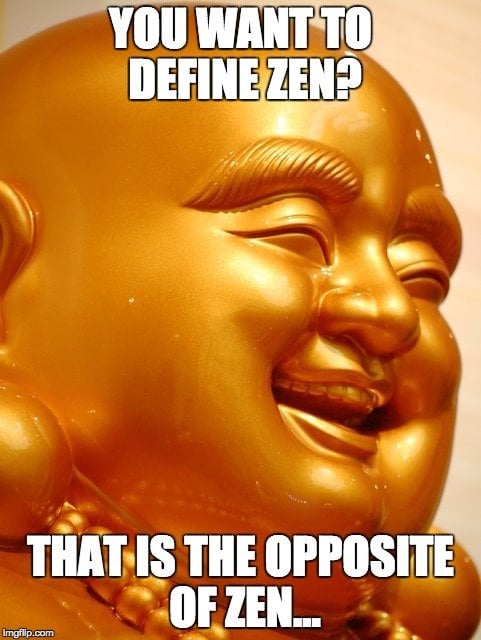Table of Contents (click to expand)
Zen is a long-standing form of traditional wisdom, which has had an impact on billions of people all over the world. The core of Zen is a personal relationship with your own mind, and a higher, undefined entity outside of yourself. “Being Zen” is essentially a state of being at peace with your own thoughts, and being self-aware of your place within the universe.
The first mistake that most people make when they begin talking about Zen is their attempt to give it a firm definition, either as a practice, hobby, habit, belief system, philosophy, religious direction or guiding principle in life. The term “Zen” has caught on like wildfire in the western world, and is plastered on countless online article titles and other modern associations, but those definitions all miss the mark.
At its very core, Zen is a long-standing form of traditional wisdom, which has had an impact on billions of people all over the world.
Before we can understand what “Zen” actually means, we should look at the history of this enigmatic idea. First and foremost….
Recommended Video for you:
The History Of Zen
Nearly 1500 years ago, in 6th century China, the Ch’an school of Buddhism was first founded, and for nearly 600 years, it was restricted to that country, developing and ingraining itself within the culture. In the 12th century C.E., the concept was exported to Japan where it was quickly accepted and became a highly influential path of study. Although intense Buddhist meditation was being practiced prior to the Ch’an school, largely influenced by Tao beliefs, its official beginnings are marked in the 6th century.
The concept of Zen reached Vietnam (known there as Thiền) roughly 1,300 years ago, and it appeared in Korea (known there are Seon) even before that. Each country has established its own definitions and methods of practice, but all are based on the original ideas of the Ch’an School, which is why the most colloquial term around the world for following a Zen lifestyle is “Zen Buddhism”.
The ideas of Zen didn’t reach the western world, namely Europe and North America, until late in the 19th century, which is why the idea often seems so ancient to modern minds. Most people in the west have only been aware of the concept for a century, whereas the places where it is widely practiced have more than a millennia of history with this mysterious concept. Today, Zen is a popular catch-all term in certain areas of the western world, although there are traditional centers and areas for serious Zen study across America and Europe.
So… What Is Zen?
Putting the concept and wisdom of Zen into words is difficult, as it is largely based on intuition and personal interpretation. The word Zen is derived from the Chinese word Ch’an, which is directly taken from Indian sanskrit word dhayana, which means meditation, as you might expect from the explanation above.
Zen is not taken directly from the written word, nor religious transcriptions. It centers on a personal relationship with your own mind, and a higher, undefined entity outside of yourself. “Being Zen” is essentially a state of being at peace with your own thoughts, and being self-aware of your place within the universe, inconsequential (and simultaneously essential).

As mentioned earlier, trying to define Zen is nearly impossible, as it is based in the concept of paradox. It is both the acceptance of everything and nothing, the realization that Zen encompasses everything in the world, and is similarly encompassed by every minute element of existence. It is both intensely personal, while also accessible to anyone willing to embrace the wisdom of oneness with the world around them. If you sincerely free yourself from the tangible and illusory bonds of the physical world, you can tap into the unseen fabric of life, and be fully satisfied with your place in it.
What confuses people about Zen is that there is no formal practice or set routine that people must practice to achieve the enlightenment that Zen presents as a possibility. Rather than spending weeks, months or even years dedicated to religious texts or elaborate rituals, Zen Buddhists and practitioners focus on breaking through the boundaries of traditional thought and behavior to witness the world as it truly is.
The moment of this “breakthrough” is called satori, and references when the veil of our conceived reality is stripped away, and enlightenment is achieved. The connection to Buddhism is essential when understanding Zen. After all, Buddha is not considered a god, but the belief is that he achieved ultimate enlightenment through the process of Zen meditation. Similarly, Zen celebrates the idea that all human beings are already enlightened, but clouded by ignorance. They simply need to achieve satori to overcome this block.

How Is Zen Practiced?
Depending on the area of the world and the specific path of Zen Buddhism that you follow, you may “practice” Zen in many different ways. A popular form is called zazen, which basically means “just sitting” meditation, as well as kinhin, which means walking meditation. Direct observation of the breath is achieved during zazen, but observation of the mind is where the real challenge arises. The ideal scenario is to clear your mind and allow thoughts to organically rise and fall, without interacting or affecting them in any way. This flux of thought is observed, but not influenced.
Some forms of practice also include group sessions of intense meditation, often taking up to a week of silent, disciplined focus, interrupted only by short periods of sleep. Other forms of practice include the use of koans, which are akin to parables and stories of Zen masters and students, which are told to new students, so that they may meditate on the meaning of the story.
Finally, there is Zen chanting, which is often the repetition of certain sutras from liturgical sources, such as the Heart Sutra or Lotus Sutra, followed by silent meditation on that mantra or message.
Why The Confusion?
Due to the wide variety of practice methods, and the westernization of the term Zen, thanks to popular fiction and cultural figures (e.g., Jack Kerouac, author of Satori in Paris and The Dharma Bums, Robert Pirsig, author of Zen and the Art of Motorcycle Maintenance), many people aren’t quite sure what Zen means. In many cases, use of the word Zen is completely disconnected from the underlying tenets of this ancient wisdom.
That being said, the continual evolution of Zen in the modern world, as well as its practice and impact, is due to the vague and personal nature of the concept itself. However you choose to involve Zen teachings and beliefs in your life, the end goal is the same – enlightenment and a more self-aware existence.













